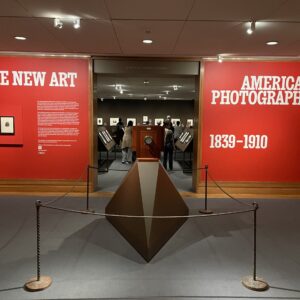JTF (just the facts): A total of 110 black and white and color photographs, variously framed and matted, and hung against greenish grey walls in a series of three rooms on the upper level of the museum (a few additional images can be found in the cafe on the lower level). A glass case in the second room contains a variety of photographic albums, contacts sheets, magazine covers and other ephemera. All of the works on view come from the museum’s permanent collection and were made between 1865 and 2009. The show was curated by Brian Wallis. (Installation shots at right © International Center of Photography, 2012. Photographs by John Berens.)
The following photographers have been included in the exhibit, with the number of prints on view, process details and image dates as background information:
First Room
Adam Schreiber: 1 inkjet print, 2009
Unidentified: 4 tintype prints, 1865, 1870, 1880, 1890, 1 albumen print, 1865, 1 gelatin silver print diptych, 1880
Eugene Atget: 2 albumen prints, 1913, 1922
Ilse Bing: 1 gelatin silver print, 1936
Walker Evans: 1 gelatin silver print, 1936
Andre Kertesz: 1 gelatin silver print, 1919
Baron Adolph de Meyer: 1 photogravure, 1909
Edward Steichen: 1 gelatin silver print, 1930
Roman Vishniac: 1 gelatin silver print, 1935-1938
Ralph Eugene Meatyard: 1 gelatin silver print, 1963
Edward Weston: 1 gelatin silver print, 1941
Yasumasa Morimura: 1 silver dye bleach print, 1998
Second Room
Miroslav Tichy: 1 gelatin silver print, n.d.
Andre Kertesz: 1 gelatin silver print, 1927
Francesca Woodman: 1 gelatin silver print, 1976
Alessandra Sanguinetti: 1 silver dye bleach print, 1998-2002
Henri Cartier-Bresson: 1 gelatin silver print, 1933
Carl Van Vechten: 1 gelatin silver print, 1954
Irving Penn: 1 gelatin silver print, 1948
Danny Lyon: 1 gelatin silver print, 1964/2006
Christer Strömholm: 1 gelatin silver print, 1959/1965-1966
Philippe Halsman: 1 gelatin silver print, 1966
Cindy Sherman: 1 gelatin silver print, 1999
Chim (David Seymour): 1 gelatin silver print, 1948
John Paul Filo: 1 gelatin silver print, 1970
Vik Muniz: 1 gelatin silver print, 1995
Charles Moore: 1 gelatin silver print, 1963
Ernest Withers: 1 gelatin silver print, 1968/2006
Susan Meiselas: 1 chromogenic print, 1978
Gilles Peress: 1 gelatin silver print, 1972
Cornell Capa: 1 gelatin silver print, 1955
Shirin Neshat: 1 silver dye bleach print, 2002
John Gutmann: 1 gelatin silver print, 1941
Unidentified: 1 gelatin silver print, 1936, 1 gelatin silver print/offset lithograph collage, 1950s
William Hartshorn: 1 gelatin silver print, 1972
Maurice Tabard: 1 gelatin silver print, 1932
Suzanne Opton: 1 chromogenic print, 2004
An-My Lê: 1 gelatin silver print, 2003-2004
Eugene Smith: 2 gelatin silver prints, 1944, 1948
Josef Koudelka: 1 gelatin silver print, 1964
Gordon Parks: 1 gelatin silver print, 1952
Harry Callahan: 1 gelatin silver print, 1948
Brett Weston: 1 gelatin silver print, 1937
Josef Sudek: 1 gelatin silver print, 1948-1964
Glass Case (in Second Room)
Unidentified: 1 album of gelatin silver prints, 1910, 3 gelatin silver prints, 1929, 1960, 1 magazine cover, 1929
Mary B. Huslig: 1 album of gelatin silver prints, 1927-1933
Elliott Erwitt: 1 album of gelatin silver prints, 1950-1955
Robert Capa: 1 gelatin silver contact sheets, 1938
Andy Warhol: 2 gelatin silver photobooth strips, 1964/1965
El Lissitizky: 1 book cover, 1933
John Heartfield: 1 photo montage magazine cover, 1934
James Abbe: 1 magazine cover, 1931
Third Room
Larry Burroughs: 1 gelatin silver print, 1965
Margaret Bourke-White: 1 gelatin silver print, 1945
Robert Capa: 2 gelatin silver prints, 1935, 1944
Unidentified: 1 inkjet print, 2003
Thomas James Howard: 1 gelatin silver print, 1928
Samuel Shere: 1 gelatin silver print, 1937
Mitch Epstein: 1 chromogenic print, 2004
William Christenberry: 1 pigment print, 1978/2009
Marco Breuer: 1 chromogenic print, 2009
Richard Prince: 1 chromogenic print, 1983
Stephen Shore: 1 chromogenic print, 1974/2000
William Eggleston: 1 inkjet print, 1999-2000
Helen Levitt: 1 chromogenic print, 1980
Louise Lawler: 1 silver dye bleach print, 1993
Robert Adams: 1 gelatin silver print, 1976
Robert Smithson: 1 gelatin silver print, 1970
Roman Vishniac: 1 gelatin silver print, 1935-1938
Samuel Fosso: 1 gelatin silver print, 1977
Carrie Mae Weems: 1 gelatin silver print, 1987
Martha Rosler: 24 gelatin silver prints, 1974-1975
David Seidner: 1 gelatin silver print, 1980
Larry Clark: 1 gelatin silver print, 1971
Gerda Taro: 1 gelatin silver print, 1937
Bruce Davidson: 1 gelatin silver print, 1959
Robert Frank: 1 gelatin silver print, 1955/1975
In Downstairs Cafe
Charles Stacy: 1 gelatin silver print, 1913
Aaron Siskind: 1 gelatin silver print, 1939
Fazal Sheikh: 1 gelatin silver print, 1997
Sheng Qi: 1 chromogenic print, 2000
Hank Willis Thomas: 1 chromogenic print, 2004
Simon Norfolk: 1 chromogenic print, 2003
Comments/Context: The ICP’s tribute show for outgoing director William “Buzz” Hartshorn gathers together a diverse mix of its institutional roots in documentary photography and photojournalism, a highlight reel of its recent exhibitions, and a parade of permanent collection acquisitions, telling an indirect story of the museum’s evolution during the past two decades. As a history of photography (even a “short” one), it falls short of being comprehensive or particularly robust, but as a history of how the ICP has seen photography, I think it’s a pretty useful exercise in hindsight.
It goes without saying that any such exhibit at the ICP would contain a heavy dose of classic photojournalism, and of course, this show delivers on that score. Robert Capa, Cornell Capa, Chim, Taro, Cartier-Bresson, Bourke-White, Eugene Smith, Peress, Meiselas, they all make their expected appearances. But from this core point of view, there is a sense of looking outward and finding contemporary connections to this material: John Paul Filo’s Kent State shooting flanked by a Vik Muniz conceptual reworking of the same scene, iconic Eugene Smith WWII images matched with recent soldering pictures by An-My Lê and Suzanne Opton, Bourke-White concentration camp victims and Robert Capa D-Day shots put together with prisoner images from Abu Ghraib. The museum is clearly interested in how photographic approaches are changing, and how these new viewpoints relate to its historic classics.
In the period falling before the museum’s core holdings (and encompassing nearly the entire 19th century), the approach seems to have been primarily historical, with an emphasis on vernacular imagery, found photographs, and other examples of documentary evidence. In more recent times, the strategy seems more diffuse, with a little of this and a little of that: some large color, some conceptual work, some abstraction, some international breadth. The show tries to tie these together on the walls via a few visual and thematic echoes, but the overall effect for the contemporary work is less coherent. This isn’t to discount the quality of the work in any way; I certainly enjoyed the Martha Rosler grid of 1970s Bowery storefronts littered with liquor bottles mixed together with an exhaustive taxonomy of synonyms for “drunk” as well as other gems from Eggleston, Levitt, Weems, Shore, Christenberry and Frank. Mostly, I think the contemporary “mixed bag” feel is evidence of a museum with a limited acquisitions budget trying its best to be everywhere at once.
In a summertime season full of group shows, I think this exhibit will be best enjoyed by those with appropriate expectations. This show doesn’t deliver a scholarly reasoned argument or an elaborate historical lesson. Instead it is a thoughtfully selected, well edited, eclectic jumble, with enough classics and unexpected choices to keep things lively.
Collector’s POV: Since this is a museum show, there are, of course, no posted prices, and given the wide range of artists and work on view, I’m going to forgo my usual collector-driven price analysis.








